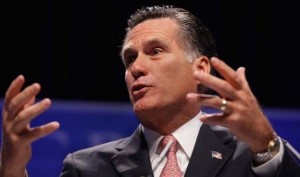
GOP presidential contender Mitt Romney hopes to benefit from the continued opposition to the 2008-09 automotive bailout.
While the U.S. auto industry may be “back,” as President Barack Obama recently declared during his State-of-the-Union address, that hasn’t changed the fact that a majority of Americans remain opposed to the 2008 – 2009 bailout of Detroit.
A new Gallup poll finds 51% of those surveyed still disapprove of the $85 billion rescue effort, with only 44% saying they approve. And the figure is even more lopsided when party affiliation is considered. The poll, conducted for the public radio program Marketplace, found 73% of Republicans opposed – though 63% of Democrats were supportive of the bailout.
Though the results are still in negative territory, overall, that’s still a significant improvement from 2009, when various polls showed that the vast majority of Americans, regardless of political persuasion, were unhappy with the use of taxpayer money to save General Motors and Chrysler.
The numbers have been slowly moving back into positive territory, various surveys have found, especially as the two once-bankrupt makers have started posting solid earnings again – and have been adding thousands of new jobs. On the other hand, reports that the U.S. Treasury could still lose perhaps $20 billion on the bailout – especially if GM’s stock price doesn’t rebound – continues to throw up a red flag.
And the GOP presidential contenders all but trip over one another in debates and stump speeches, to turn the bailout into a liability for President Barack Obama.
During a Wednesday night Republican debate in Phoenix, former Massachusetts Governor Mitt Romney said, “I think it was 2008, President Bush was still in office. And the three chief executive officers of the three major auto companies got in their private planes and flew to Washington, and said: please write us a check. I think they wanted $50 billion. And I wrote an op-ed in the paper and I said: absolutely not. Don’t write a check for $50 billion.”
While the bailout is likely to remain a subject of contention for some time, the new Gallup poll isn’t entirely negative for the auto industry overall.
“There was a time when the auto industry and our positive/negative image ratings was down at minus 35; that was in 2009,” said Gallup editor-in-chief Frank Newport. “In fact, it was second only to the oil and gas industry, which interestingly — perennially — pulled up the bottom on that.”
Now, he noted, the auto industry is back in positive territory, with a plus-10 rating. That’s still well below the image of the computer industry but well ahead of oil and gas – and the federal government, which now ranks dead last.

Correct me if I’m wrong. I’ve been in a running debate with several people about the auto bailouts. I don’t need to go into their arguments, as they mirror what the Republican candidates are saying about the aid the auto companies received. Admittedly, I’m extremely prejudiced, being a GM/UAW retiree, and basically had my bacon saved by the government intervention.
My response to the critics is that while the federal government did intervene with billions of dollars in aid using taxpayers’ money, the states have been using millions of dollars of taxpayers’ money as enticements to mostly non-union auto companies in order to get them to move to one particular state or the other. For example, it was well-publicized that VW was enticed to move into the Chattanooga area by about $400 million in infrastructure improvements provided by Tennessee, and Honda was gifted by the state of Indiana with over $200 million dollars (and my further argument is that both times when Honda has hired workers, those workers were limited to being from a geographic location that only included 20 of Indiana’s 92 counties); I would assume that the $200 or so million allocated to the Honda project came from all of us, in all of Indiana’s 92 counties, but maybe I err in this opinion.
I see little difference in whether a state entices a corporation to locate within its borders by using state taxpayer money or whether the federal government chooses to save an entire industry by using federal money to “bail out” certain corporations. In fact, those of us who were “bailed out” were committed to pay the money back, while Honda and VW and many others are just basically being gifted, unless I have missed something.
Do my arguments have merit? Again, correct me if I am wrong.